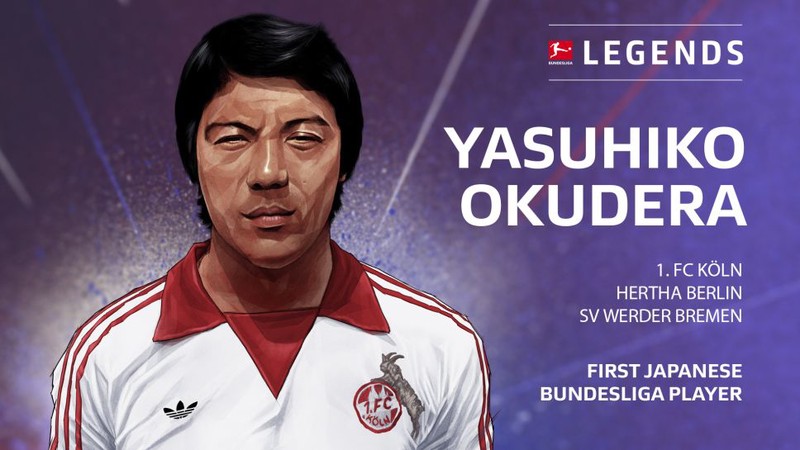
When you think of football and Japan, then Shinji Kagawa, playing for Borussia Dortmund, inevitably comes to mind. Kagawa has been with Dortmund and is supporting the offensive midfield since 2010, with a brief interruption towards the British Isles, and he definitely has brought it to quite some fame in German. And in addition there are a whole lot of other representatives from the Far East who enchant football fans in the Bundesliga every weekend, such as Makoto Hasebe, who kicks for Eintracht Frankfurt and has been playing in Germany for 10 years.
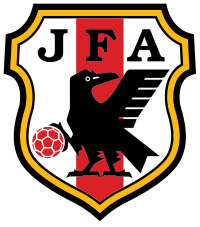
But no, the era of the Japanese football players did not begin with Shinji Kagawa, probably the best known player from the land of the rising sun in Germany, but actually quite some time before with a player who is probably unknown to the most of us today.
However, this player had already made it into the arenas of the top German football league more than 40 years ago.
Already in the year 1977 the 1. FC Köln had signed Yasuhiko Okudera, who for the first time ever introduced the Japanese way of playing football to the surprised spectators in German Bundesliga stadiums.
Foreign players were not yet represented in the masses, as we can see today, and the big names of the football world were rather attached to nations like Brazil, Italy or England. Although the Japanese national football team had already made a successful appearance at the Olympic Games, it was not really noticed and taken seriously on the global football stage. Even the bronze medal in Mexico in 1968 could not really help, but at least the Japanese kickers had made their first clear statement.
In the 1970s, the Japanese football league was still a long way from what is now the professionally run J-League, which recently got itself the name J1. At that time only a very few players in Japan could have imagined living off their beloved hobby , they all went to work during the week to make ends meet for themselves and their families.
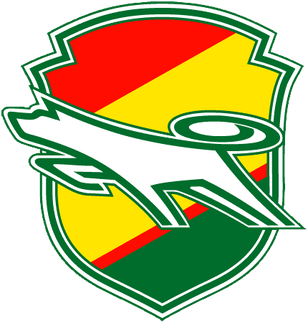
Yasuhiko Okudera was a young man who worked for Furukawa Electrics (now JEF United) and after work he played for the team of his employer in the Japan Soccer League.
But he did so with lots of passion and also quite some success, and with his team he won both the Japanese championship and the Japanese Emperors Cup. Engagements in the Japanese national team helped to consolidate his reputation throughout the country.
The crucial year 1977
He hadn't really attracted the attention of the international football public until then, but luckily there was the year 1977, when the manager of the Japanese national team took the team on a tour to Germany and encouraged his players to train with the German Bundesliga team.
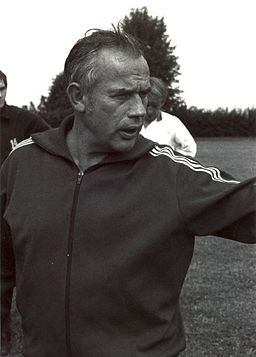
Okudera had organized for himself some training sessions at 1. FC Köln, where at that time the legendary coach Hennes Weisweiler was coaching.
Weisweiler, who was said to have had a good eye for promising talents, recognized the potential and abilities of the Japanese and, to everyone's astonishment, offered him a contract in Köln.
The German but also the Japanese public were more than once surprised by this decision.
Until then, no Japanese had played abroad as a professional, and the concerns of the Japanese federation were big, also his employer Furukawa Electrics was reluctant to let his player go. Ultimately, however, it was decided that this change would have a positive impact on the development of football in Japan, and 1. FC Köln and the Bundesliga suddenly got their first Japanese player.
At first Okudera was laughed at and he had some initial problems getting used to the demands of professional football, but quickly found his place in the team and just a few weeks after moving to Germany he made his debut in a game against MSV Duisburg.
In his first year in the Bundesliga he played in 24 matches and scored 6 goals and immediately with Köln became German champion and cup winner. His flying header on the last matchday to the 5:0 final score against St. Pauli was even elected goal of the month.
In the following season Okudera then even played with Köln internationally and in the semi-final play against Nottingham Forest he was the first Asian player to score a goal on the European stage. Even if it was not enough for Köln to reach the final, Okudera left a lasting impression.
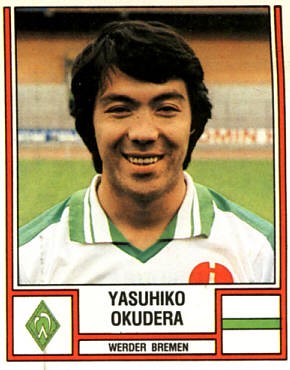
After another year in Köln the then still young coach Otto Rehagel brought him first to the capital team Hertha BSC and then to Werder Bremen, where he established himself as a regular player and contributed to Werder being perceived as a top German club.
All in all he played in 234 matches and scored 26 goals until his farewell from the Bundesliga in 1986, in addition to 25 appearances and 8 goals in the 2nd Bundesliga, in which Bremen briefly was relegated at the beginning of the 1980s.
Okudera finished his active career at his home club, which had since changed its name to JEF United, and he was once again able to win the Japanese championship there.
With him, JEF United became the first Japanese team to win the Asian Club Championship. He was the first professional soccer player in Japan and ended his career as a player after 2 more years in 1988.
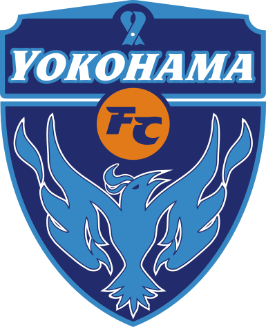
At the end of the 90's together with his friend and former FC Köln teammate Pierre Littbarski, who had also played for JEF United, he helped to found Yokohama FC, which finally moved up to J1 in 2006 and where today he is still the club's president.
Littbarski was one of the first Bundesliga players who found their way in to the Japanese top league, where he then coached Yokohama and Avispa Fukuoka.
Okudera's heritage
Yasuhiko Okudera left a lasting impression, not only in his home country Japan but also in the German Bundesliga. Even though the players from the Far East got out of focus for some time after his departure from Germany, he helped to pave the way for all the many friendly Japanese football players who have since made it into the many leagues around the globe.
At the latest since Naohiro Takahara arrived at HSV in 2003, the popularity of the Japanese kickers has increased immensely again and today some high-class representatives of Japanese football are competing in the Bundesliga. And not only there, as they are very popular players in many European top leagues, playing for some of the major teams and helping to strengthen the image of Japanese football.
But there's another time to read more about that.
Comments